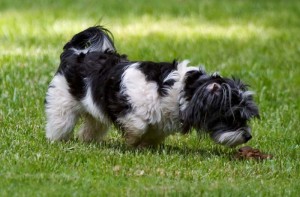As a dog owner, you likely have witnessed your dog eating repulsive things, such as garbage or dead animals. What about eating his own feces or the feces of other animals. Although this may seem amusing, eating poop can be the result of a medical condition.
The act of eating feces, or coprophagia, occurs in 10 percent of dogs. Although it is considered normal behavior, it is not a desirable behavior for many dog owners. If your dog has coprophagia, find out the underlying cause and ways you can limit his feces consumption.
Why dogs eat feces
This behavior may sound disgusting to us humans, but dogs were actually born to eat poop. Before they became pets thousands of years ago, they lived in the wild as scavengers. They lived off the land, meaning they ate whatever they could find. This included their own feces as well as the feces they found from other animals.
Today, female dogs eat the poop of their puppies. This is part of their instinct to keep their den clean so that they do not attract predators. In addition, in households with multiple dogs, the submissive dog will often eat the poop of the dominant dog.
Dogs are very intelligent creatures. In some cases, they may eat poop in order to please their owners. For example, a dog that accidentally poops in the house may get punished by his owner by having his nose rubbed in the poop. The next time it happens, the dog may eat the poop to dispose of the evidence.
Dogs often mimic the behavior of other dogs or their owners. A dog may see his owner clean up his poop and may “help” by eating it. If a dog sees other dogs eating poop, he may do the same.
Neglect may also lead a dog to engage in coprophagia. In order to get any type of attention from their owner – even negative attention – neglected dogs will eat their poop. If they are left alone for long periods of time and become bored and hungry, they will eat their poop to clean their home and pass the time.
If there is no apparent reason for a dog’s poop-eating habit, it may due to a medical condition. Pancreas problems, parasites or a lack of nutrients may be the cause. Therefore, a dog exhibiting signs of coprophagia should be checked out by a veterinarian.
Preventing coprophagia
Sniffing feces and other interesting objects is just a dog’s nature. Therefore, getting him to stop the behavior can be challenging. The best way to stop a dog from eating feces is to remove them regularly from the dog’s area. However, this can be a challenge to a dog owner who simply does not have the time to supervise his or her dog all day.
Other ways to prevent coprophagia include:
- Giving the feces a bad taste – If the feces don’t taste so good, the dog will be less likely to eat them. There are products such as For-bid and Dis-taste that are put in the dog’s food (or the food of the animal whose feces the dog is eating). The product gives the feces a bad taste. Some dog owners put Tabasco or chili powder on the feces to deter their dogs. Although this may work at first, some dogs quickly become immune to the spicy flavor.
- Keep control of the dog – When walking or out in public, keep your dog on a leash. A leash allows you to quickly pull your dog away should he encounter a pile of feces along the way. Some owners use a muzzle because a dog cannot eat with a muzzle on. Dogs with muzzles should always be supervised.
- Feeding high-quality food – The type of food you feed your dog should be fully digestible. Dogs are often attracted to bits of dog food found in their feces. If you notice them in your dog’s feces, switch to food of a higher quality. Specialty pet stores offer better food than grocery stores.
- Use supplements – It is believed that some cases of coprophagia are caused by a lack of enzymes in the dog’s body. Prozyme is a supplement that is known to help lessen the urge to eat feces. It aids in digestion and helps absorb various minerals.
- Designate a potty area – Teach your dog to go potty in one area of the yard. By keeping his feces out of his play area, you decrease the chances that he will resort to eating them.
- Teach commands – If you catch your dog checking out feces, you can use a command that will tell him to leave them alone. Something simple such as “Leave it!” works well.
- Startle him – The next time you catch your dog in the act, startle him with a loud noise such as an air horn. Your dog will associate eating feces with an unpleasant noise and eventually stop the habit. You need to be consistent, though. Expect to repeat this tactic each time for at least two weeks.

Leave a Reply